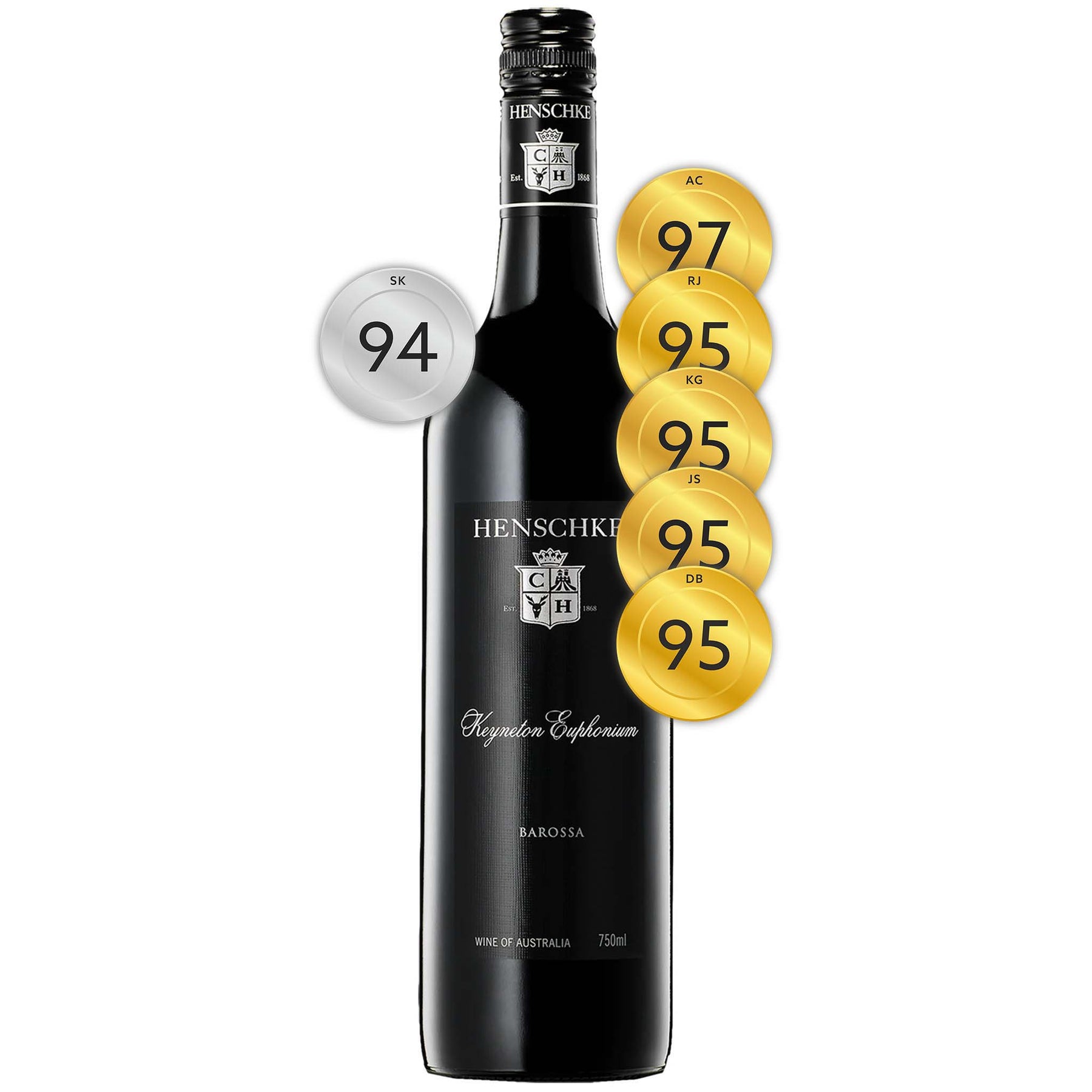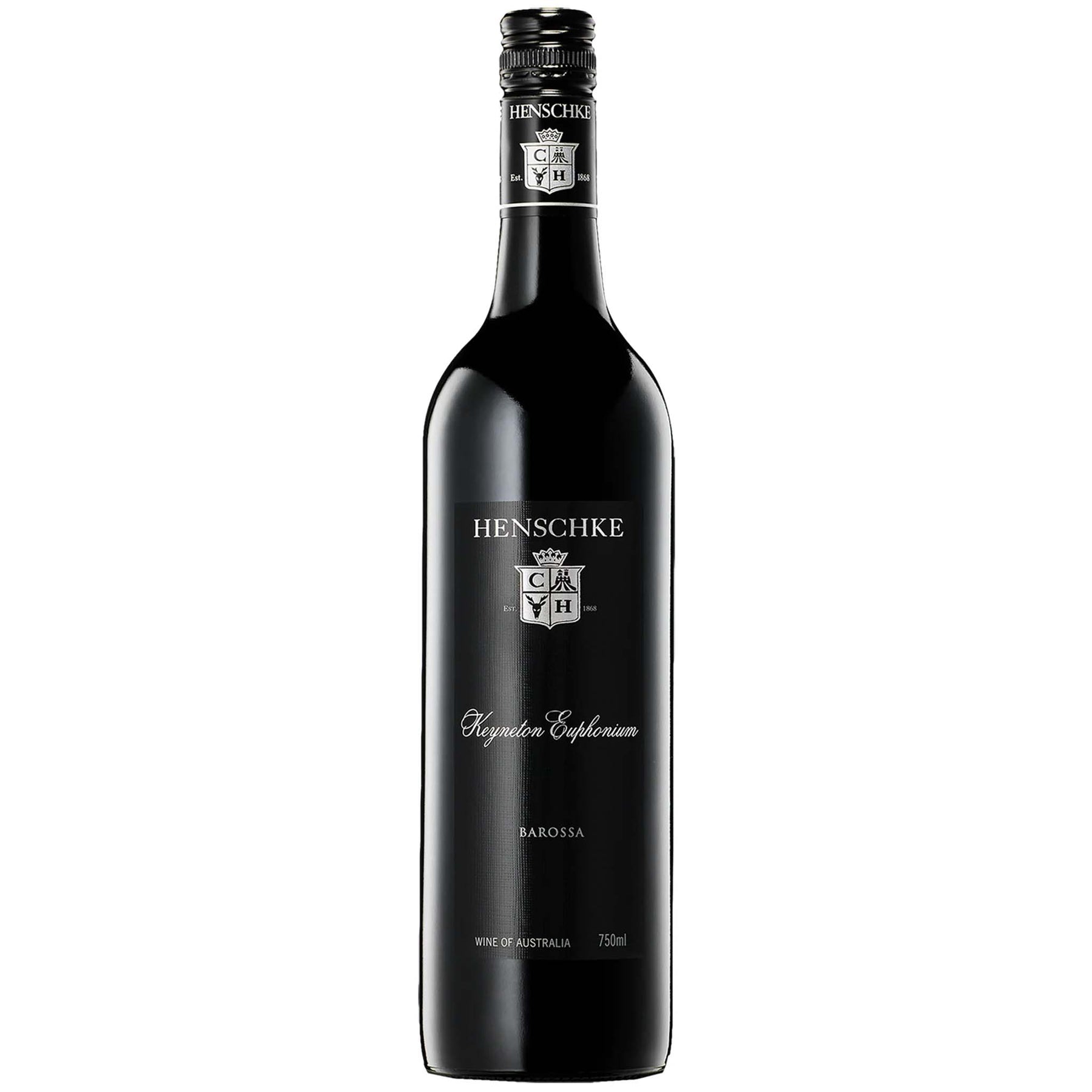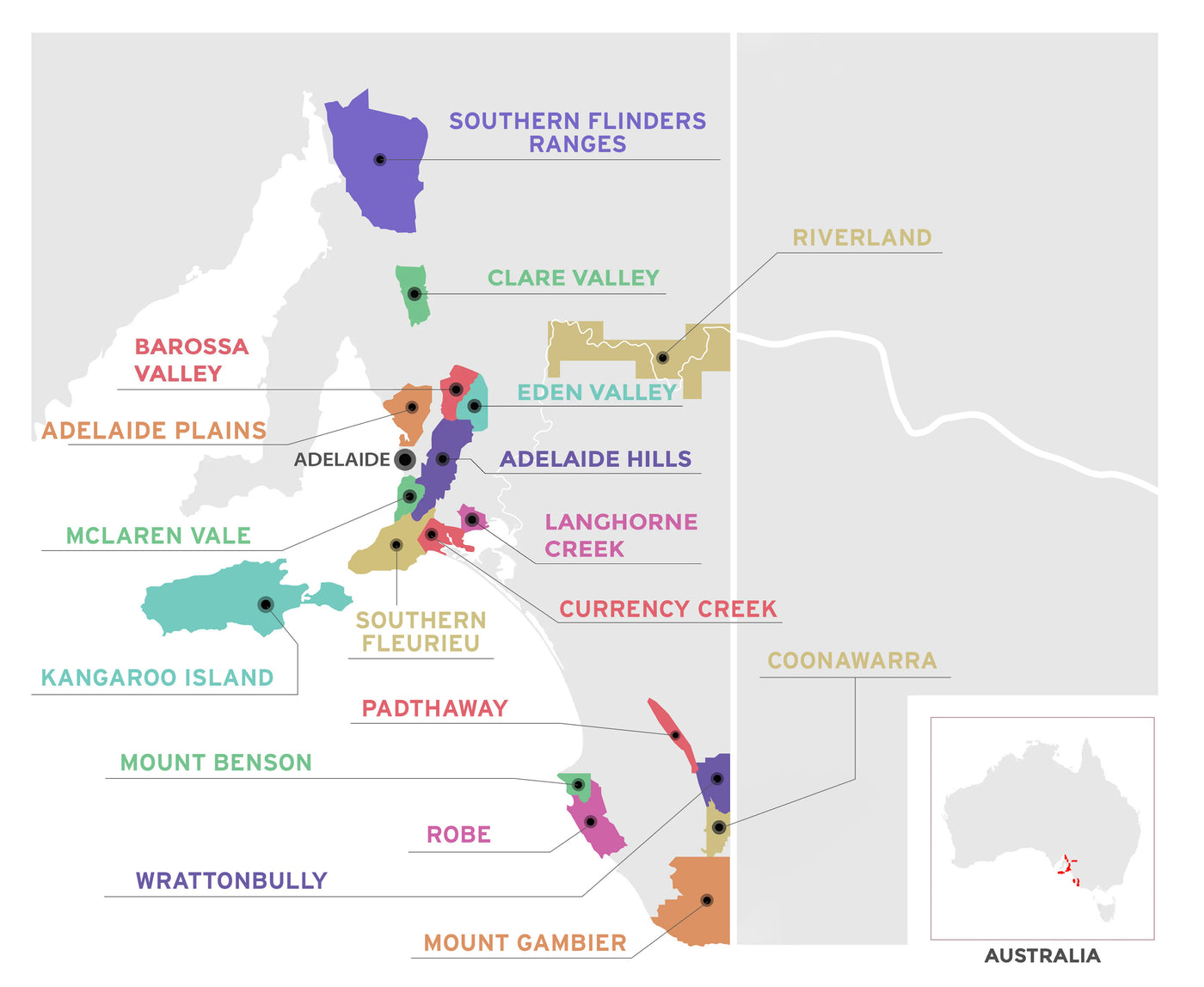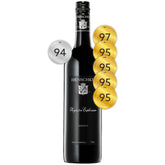

Henschke Keyneton Euphonium Shiraz Blend 2018
Style: Red Wine
Varieties: Shiraz (65%), Cabernet Sauvignon (23%), Cabernet Franc (9%), Merlot (3%)
Closure: Screwcap
Henschke Keyneton Euphonium Shiraz Blend 2018
Warehouse
34 Redland Drive
Vermont VIC 3133
Australia
Critic Score: 97
Alcohol: 14.5%
Size: 750 ml
Drink by: 2045
The 2018 Keyneton Euphonium is a blend of shiraz, cabernet sauvignon, cabernet franc and merlot. The Shiraz comes from vines, up to 50 years in age, from both the Barossa and Eden Valleys, while the remaining grapes are also a mix of both regions. The wine is named after pastoralist Joseph Keynes who settled at Keyneton in 1842 and after whom the village was named. Keyneton became a musical focus for early settlers such as the Henschke Family Brass Band, which featured wonderful wind instruments such as the B flat euphonium, a large brass wind instrument made in Germany in the late 19th century.
"Fragrant and lifted with dark berry, violets and earth spices showing. Medium in weight yet carrying an underlying power that demands your attention. There's a seamless nature to the wine that suggests a great blending hand in the background, not one note out of place. Great flow and it caresses the palate incredibly long and lingering." Stuart Knox
"65% shiraz, 23% cabernet sauvignon, 9% cabernet franc and 3% merlot grapes grown in the Barossa (Eden Valley and Barossa Valley regions). Deep crimson with vibrant ruby hues. Lifted aromas of ripe blackberry, blackcurrant, cassis, Satsuma plum, blueberry, anise and violets with hints of black pepper and cedar. Rich and concentrated flavours of dark plum, blackberry and blackcurrant, with a pure, plush and focused mid-palate, bright, balanced acidity, and excellent length, carried by fine-grained, ripe tannins. One of the all-time great vintages of this wine. Matured in 20% new and 80% seasoned (71% French, 29% American) oak hogsheads for 18 months prior to blending and bottling. Exceptional vintage, Drink: 25+ years." Henschke (Mar 2022)
Expert reviews
"Deep colour. A classic Henschke style with developed blackberry, cassis, dark chocolate, roasted walnut aromas. Richly flavoured, complex and bittersweet with attractive ripe blackberry, blackcurrant, roasted walnut, hint chestnut notes, sage and tobacco, lovely mid-palate density and fine supple chocolaty tannins. Finishes claret firm with a fine graphite plume. A superb vintage in this series." Andrew Caillard MW - 97 points
"Detail is a wonderful thing. If you stick your nose in the glass and close your eyes, perhaps tilt your head just so, you can pick out the individual components of this wine, yet they mesh together perfectly. Juicy berry and plum fruits, abundant spice, fine-grind tannin grip, a fine lacy acid line and an elegant, perfectly poised, slow fade out of pure fruit. Drink by 2038." Dave Brookes, Halliday Wine Companion - 95 points
"It was a super vintage in both the Barossa and Eden Valley. This is a blend of Shiraz with contributions from Cabernet Sauvignon, Cabernet Franc and Merlot. Nose displays those rich dark aromas that point to a fully ripe mix of fruit. The palate has a grainy, slightly chalky texture which allows the generous fruit flavours to build and hold their lines to the long finish. Dry, slightly savoury earthy finish with a trace of vineyard ironstone. Drink: 2022-042." Ray Jordan, Wine Pilot – 95 points
"The Shiraz comes from vines, up to a half century in age, from both the Barossa and Eden Valleys, while the remaining grapes are also a mix of both regions. Black/purple in colour, the nose exudes concentrated notes of cassis and blackberries. There are warm earth tones, mocha, coffee grinds and licorice. A hint of fresh blueberries. Good focus with considerable tannins but they are soft, and supple, and help carry the wine to its lingering and persistent finish. Chocolate notes come to the fore as it nears its end. When we say that this will age and improve for ten to fifteen years, we really mean longer than that but if you do say so, some may feel that they'll need to wait too long for it and I would hate to put anyone off. One of the best Euphoniums I can recall. Drink: 2022-2037." Ken Gargett, Wine Pilot - 95 points
"Spicy and creamy shiraz-based blend with velvety tannins framing a silky core of dark fruit, licorice, cloves, grilled herbs and spices. Five spice and smoked paprika coming through. Full-bodied yet elegant." James Suckling, JamesSuckling.com - 95 points
"Deep ruby red in the glass. Fragrant and lifted with dark berry, violets and earth spices showing. Medium in weight yet carrying an underlying power that demands your attention. There's a seamless nature to the wine that suggests a great blending hand in the background, not one note out of place. Great flow and it caresses the palate incredibly long and lingering. Drink: 2022-2027." Stuart Knox, The Real Review - 94 points
Stephen & Prue
Winemaker Stephen Henschke, fifth-generation family member and youngest son of Cyril Henschke, showed great interest in science and winemaking at an early age. With a wonderful family heritage of more than 140 years of grape growing and winemaking spanning five generations, this came as no surprise. He is proud that the Henschke name and reputation is inexorably linked with red wines in general and Hill of Grace in particular, but with winemaking in his lifeblood, he approaches all wine styles with the same depth of passion and commitment to quality.
Stephen has retained the traditional approach to red winemaking used by his forebears. They handled the wines gently, used minimal racking, low sulphur, and gentle fining and filtration. They took a puristic, holistic approach that had been passed down from generation to generation so his winemaking techniques are almost intuitive. He keeps intervention to a minimum, favouring gentle extraction of his reds so as to retain freshness and subtlety, and applies Old World techniques to his New World white grapes for elegance and texture. At the '50 Years of Hill of Grace' celebration in 2008 when Stephen tasted every vintage – some for the first time – he was struck by how closely he was emulating his father's winemaking of the late 1950s and the 60s with his minimal intervention techniques.
Stephen is also mindful of his European roots and is a proud supporter of the historical language, food, religion and wine culture of his Silesian forebears still alive in pockets in the Barossa.
Stephen's support and contribution to the Barossa was acknowledged in 1984 when he was inducted into the Barons of Barossa wine fraternity, of which his father Cyril was a founding member.

Viticulturist, botanist and environmentalist Prue Henschke manages their 105 hectares of vineyards in the Eden Valley and Adelaide Hills. With today's advanced viticultural practices the greatest focus at Henschke is given to the quality of fruit in the vineyard. The increase in quality of both the red and white wines, which has helped take this iconic wine brand to the next level, is largely attributed to the increase in fruit quality.
Although Prue didn't set out to work in the wine business, she has become a key figure in the evolution of Australian viticulture and wine. She has a commitment to restoring balance to the natural environment, minimising harmful impacts and to regenerating the Henschke vineyard ecosystems. This has seen her win numerous local and international awards.
Prue became part of the Henschke world when she married Stephen, a fifth-generation Henschke. And for over 30 years, she has been a true pioneer. Her influence in the vineyards has been a balancing act of respecting tradition and protecting history while making bold decisions to innovate and improve. She restructured the vineyards, introduced new trellis types and transformed soil management using composts and mulches, which has led to adoption of organic and biodynamic practices.
How has Prue managed to blaze new trails among precious, historic vineyards. It all comes down to science. Science is the link between the vines and the quality of the wines that come from it. And it's how Prue's world collided with the Henschke dynasty. Her early interest in science led her to study botany and zoology at Adelaide University in the early 1970s. There she met Stephen, a fellow science student. After graduating, the pair headed to Germany for two years, where Prue became involved in viticulture and plant physiology. She worked at the Geisenheim Institute Vineyards and volunteered on a project in the Botanic Institute at Geisenheim – an experience that sparked a lifelong passion and set her on the path to becoming a leading viticulturist.
After returning to Australia and studying Wine Science alongside Stephen, Prue gained more experience in viticultural research, before becoming a viticultural consultant. In 1980 she started working with Stephen, who had taken over as winemaker at Henschke. They bought an apple orchard in the Adelaide Hills, near where the very first Henschke vineyard had been planted in 1862, and converted it to a vineyard, creating a 'living research station' where they experimented and tested theories on cool-climate viticulture. This revolutionary research became vital in growing and improving cool-climate wine production in Australia.
In 1987, Prue took on her current role at Henschke. She not only manages over 100 hectares of vineyards but is custodian of precious old vines, some of which have been in the earth since the first days of the family estate.
Prue represents the pinnacle of viticulture in Australia. Her influence has reached cool-climate vineyards across the country, and in 2016 she was named Viticulturist of the Year at the Australian Women in Wine Awards. She is a highly respected voice in the Australian wine community and a strong campaigner for environmental issues. Prue is passionate about protecting the natural environment while growing grapes good enough to create Australia's best wine. And Henschke wines have never been better.
Reference material taken from: https://www.australianwine.com/en-AU/our-makers/prue-henschke
About the winery

Henschke is the best medium-sized red wine producer in Australia and is recognised as one of the world's great wine labels. It is home to Australia's most famous vineyard, the majestic Hill of Grace, which produces Australia's greatest single vineyard wine. Outstanding Shiraz, cabernet sauvignon and Rieslings are produced by the fifth and sixth generations of winemakers, with a focus on single-site expressions that tell the story of the land and the people that made them.
The Henschke family has been making wine since Johann Christian Henschke planted a small vineyard on his farming property at Keyneton in 1862. He was one of many Silesians who had fled their homeland in search of religious freedom. Johann Christian built a small two-storey cellar into the side of the hill and the first vintages of riesling and shiraz were released in 1868.
Each generation has built upon the foundations of Henschke. In more recent times, fourth-generation Cyril Henschke pioneered varietal and single-vineyard wines at a time when blended wines and fortifieds were in vogue. His greatest legacy was the creation of Hill of Grace and Mount Edelstone in the 1950s, single-vineyard shiraz wines from Eden Valley that have captured the red wine world's imagination.
Today, it is fifth-generation winemaker Stephen Henschke and his viticulturist wife Prue at the helm, passionately upholding the family name and reputation. This highly regarded team has won a multitude of awards that recognise the complementary nature of their roles and Henschke has gone from strength to strength over the past three decades under their guidance.
"Prue and I are the current 'keepers of the flame'. Just as earlier generations have done, we want to manage the vineyards and winery so they can be passed on to the next generation in better condition than we inherited them. The last 50 years have been an incredible journey for the Australian wine industry. Hill of Grace and Mount Edelstone are arguably the two oldest single vineyard wines produced in this country that tell the wine story of Australia. Our vision would not be complete without the expectation that future generations will uphold and perpetuate our belief that such ancient and unique single-vineyard sites can produce exceptional wines that are prized for their beauty and rarity."
In recent years Stephen and Prue have welcomed next-generation family members into the business. Their son, Johann, has carried on the family winemaking tradition in his capacity as winemaker and viticulturist since 2013, as the fifth and sixth-generations transition through the period of the transfer of knowledge, skills, and traditions.
With many of the challenges for the next generation already well-documented, Johann expects that innovation and careful strategic planning will be crucial tools for him and his peers to utilise. Above all, continuing on the traditional winemaking techniques which the Henschke family have used for generations, and ensuring that Henschke continues to be nurtured in the same prudent way that it has always been, will allow it to be passed on to successive generations and to be held in the same high regard as it is today.

Henschke Vineyard Map

South Australia
South Australian is responsible for more than half the production of all Australian wine. It is home to more than 900 wineries across 18 wine regions. The regions are Adelaide Hills, Adelaide Plains, Barossa Valley, Clare Valley, Coonawarra, Currency Creek, Eden Valley, Kangaroo Island, Langhorne Creek, McLaren Vale, Mount Benson, Mount Gambier, Padthaway, Riverland, Robe, Southern Fleurieu, Southern Flinders Ranges and Wrattonbully.
Many of the well-known names in the South Australian wine industry established their first vineyards in the late 1830s and early 1840s. The first vines in McLaren Vale were planted at Reynella in 1839 and Penfold's established Magill Estate on the outskirts of Adelaide in 1844.
South Australia has a vast diversity in geography and climate which allows the State to be able to produce a range of grape varieties - from cool climate Riesling in the Clare and Eden Vallies to the big, full bodied Shiraz wines of the Barossa Valley and McLaren Vale. Two of Australia's best-known wines, Penfolds Grange and Henschke Hill of Grace, are produced here. There is much to discover in South Australia for the wine lover.


